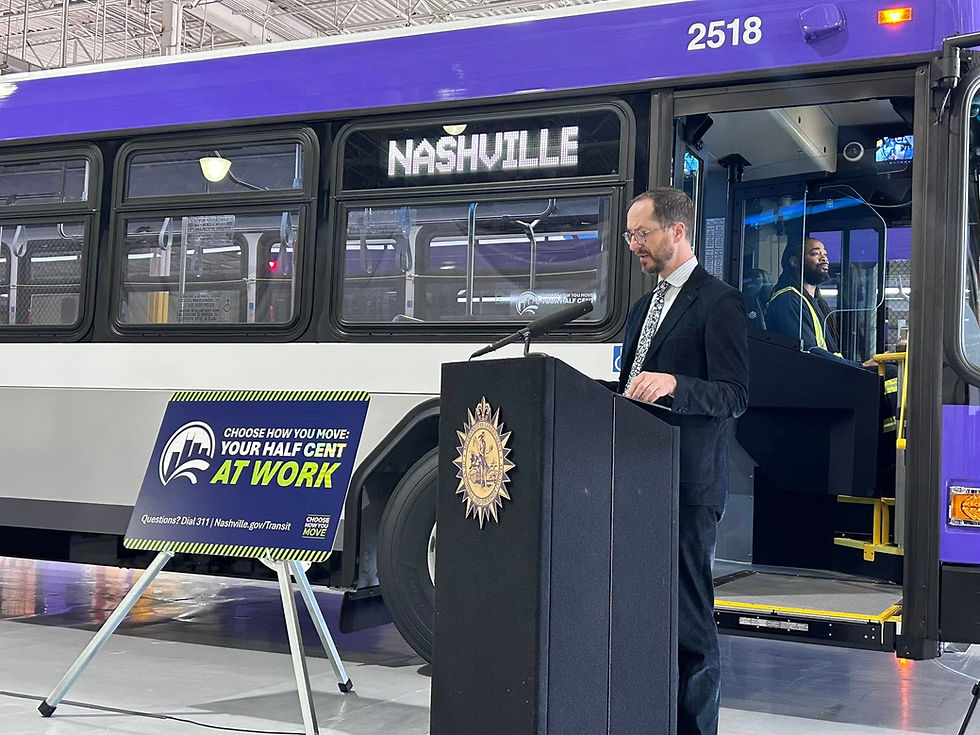Governor’s IMPROVE Act gains momentum in resolutions of support across state
- jessicadauphin
- Feb 15, 2017
- 4 min read
By Kerri Bartlett via Williamson Herald
Tennessee Department of Transportation Commissioner John Schroer spoke before the Franklin Board of Mayor and Aldermen Tuesday asking for support of Gov. Bill Haslam’s IMPROVE Act that would provide sustainable funding for roads.
Franklin BOMA voted unanimously in support of the Act, joining the Williamson County Board of Commissioners in their vote of majority approval, 19-5, just cast the night before after a similar visit from Schroer.
Rep. Sam Whitson, R-Franklin, who serves on the House transportation committee and sub committee, accompanied Schroer at the BOMA meeting, speaking for the constituents of his district.
“I knocked on a lot of doors and the number one issue in my district is traffic,” Whitson said.
He said the transportation subcommittee could vote as early as March 1 on the governor’s transportation plan.
By an overwhelming majority, both local government bodies stand behind Schroer and the governor after the two spent over two years devising a plan from information gained by a 15-city tour to determine the real needs across the state in road funding.
In 2014, when the tour first began, Haslam cited a $6 billion backlog of road projects across the state, which lacked funding for completion. However, over the past two years, that number has jumped to about $10 billion.
The governor’s plan would implement a gas tax increase of 7 cents per gallon for gas and a 12-cent increase per gallon in diesel fuel. Car registration fees would be raised by $5 and a 3 percent increase in rental cars would be implemented. Those measures would fund about $278 million annually to complete hundreds of road projects across 95 counties, including 22 projects in Williamson County, taking about 10 to 12 years to rectify the state’s massive backlog of projects.
During his 15-city tour, Haslam said that if the state did nothing to create a sustainable revenue stream for roads, projects would not be completed for the next 30 years.
However, Schroer told BOMA legislators on Capitol Hill need “encouragement” to cast votes of approval for the Act in the 110th General Assembly.
Schroer told the county commission Monday the only thing that stands between a favorable vote could be the three-letter word – “tax,” especially followed by the descriptor “increase.”
“Some legislators say that their constituents are saying they don’t want a tax increase,” Schroer told the Herald. “Lots of cities and counties are passing resolutions in favor of the governor’s proposal. It sends a message of support to Legislative Plaza and helps them make up their minds.”
The Middle Tennessee Mayor’s Caucus and the Tennessee County Commissioners Association support the tax. In a 2015 Williamson, Inc. survey 65 percent of the business community respondents supported a gas tax increase to pay for transportation improvements and/or mass transit.
Franklin Alderman Bev Burger, 1st Ward, said she would vote in support of the resolution.
“Most of the people in my district are in favor,” she said.
Williamson Inc. President and CEO Matt Largen also wrote recent a piece, “Governor’s gas tax could be small price to pay for economic success,” which describes the benefits improving roads could bring to the county.
To balance the proposed increases, Haslam has introduced one of the largest tax cuts in state history, about $270 million, generated from an overwhelming state surplus of almost $1 billion this year from booming state revenue. Haslam’s proposed tax cuts include decreasing the grocery sales tax from 5 percent to 4.5 percent, decreasing the Hall Tax by 1.5 percent further which would phase out the tax in five years instead of the previously cited six years as well as $113 million in cuts to the Franchise and Excise tax (F&E) benefitting the manufacturing industry, which currently carries the third highest business tax in the nation.
“Some people forget that the governor’s plan also includes tax deductions,” Schroer said. “People keep talking about the gas tax increase, but this is a truly a revenue neutral plan.”
However, Rep. Glen Casada, R-Franklin, has said the governor’s plan will be a tough lift to get passed in the transportation committee and has expressed his support of Rep. David Hawk’s alternative transportation proposal that would allot .5 percent of revenue generated from the state sales tax in the budget’s general fund to TDOT. Haslam as well as Rep. Charles Sargent, R-Franklin, have criticized Hawk’s plan by arguing that it charges all Tennesseans for the upkeep of roads even when they don’t use them and eliminates the revenue made from out-of-state road usrs that buy gas while passing through Tennessee.
Schroer said that the governor’s plan presents a more “conservative” approach because it is a true “user fee,” only for those who buy gas or diesel.
“It’s fair that those who use roads should have to pay for them,” Schroer said in a previous interview.
Sargent seems to agree, saying in a previous interview that he believes in a user fee, saying about 60 percent of Tennesseans pay for the gas tax, leaving less of the burden on the gas tax to Tennesseans.
Alderman Margaret Martin, 4th Ward, said that she supports the minimal tax.
“It seems to me that 7 cents is nothing, and if hurts that much, we need to give up some of our cars. I wish we could have seen this done yesterday.”





